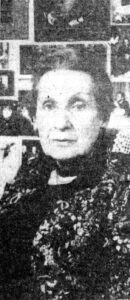
Ola Watowa. Phot.: Dziennik Dolnośląski nr 38 (105), 22-24 II 1991, CC BY-SA 3.0, https://commons.wikimedia.org/w/index.php?curid=14802552
Paulina Lew was born in 1903. Against the will of her parents, she began studies at the Dramatic School in Warsaw, where as a 20-year-old beginner actress she met an intriguing, avant-garde poet – Aleksander Wat. They got married in 1927. Upon the request of her husband, she soon dropped out of the acting school and started to work as a secretary in ‘Literary Monthly’. In 1931, their only child was born – their son Andrzej.
The happy life of Wats and Aleksander’s flourishing artistic career were interrupted by the outbreak of war. After escaping to Lviv in January 1940, as a result of a provocation, Wat was arrested. Three months later on the night of April 13–14, Ola and her son were deported to Kazakhstan. Ola described the dramatic stay in exile with a small child in her book, Everything That Matters….
At the beginning of 1942, the family members found themselves in Kazakhstan and returned to Warsaw after four years. In 1959, thanks to the Ford scholarship awarded to the poet, they emigrated to the West. In 1963 they obtained the status of stateless persons.
Ola Watowa’s loneliness after the arrest of her husband as well as the lack of help from both Aleksander Wat died in 1967 as a result of an overdose of painkillers (he fought an incurable disease for 16 years). In his diaries he repeatedly said goodbye to his loved ones, which he noted meticulously. However, the last note: ‘Do not rescue’ was the one that ended his story. From then on, despite great suffering, trying to cope with the trauma after the death of her beloved, Ola Watowa listened her husband’s voice from the tape. Just before his death – unable to write anymore – together with Czesław Miłosz, Aleksander Wat recorded his opus magnum – memories My Century. Later, Ola Watowa took care of her husband’s work, publishing (also thanks to the help of Czesław Miłosz) the writer’s hitherto unknown work.
Ola Watowa, despite the publication of her unique and moving memories, as well as a short text entitled Passportization, published by Jerzy Giedroyc in ‘Historical Notebooks’, was, however, in the shadow of Aleksander all her life – initially devoting her acting career, and later editing her husband’s works. This fascinating woman and the author of the ‘unique testimony of the century’ died in Paris in 1991.
Translated from Polish: Sylwia Szarejko, Kamila Czechowska
Biogram based on the book: S. Szarejko, Kobiety niepokonane/Undefeated Woman, Białystok 2019, edited by Sybir Memorial Museum



